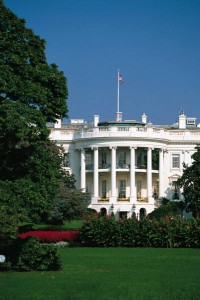This is part 2 of a 6-part article.
Anti-Federalist Prediction #1: The Executive Branch Will Increase Influence Over National Budget
 Prediction: The Executive Branch will increase its say over the national budget and then drastically increase debt, run harmful deficits, engage in unconstitutional military actions, and otherwise run the economy toward ruin.
Prediction: The Executive Branch will increase its say over the national budget and then drastically increase debt, run harmful deficits, engage in unconstitutional military actions, and otherwise run the economy toward ruin.
Unfortunately, this has proven to be accurate. We have learned over time that the people don’t hold the White House accountable for this behavior because every president blames the last political party (in Congress and the Presidency) for the problem.
Both parties use the Executive Branch to commit funding for their projects, even as taxpayers are funding the projects of past administrations.
The Federalists responded to this anti-Federalist warning by correctly pointing out that the Constitution only gives the House of Representatives power over the purse strings.
The Federalists’ “solution” worked for more than a century, but unfortunately for us the Cold War brought secretive and expansive government, and the role of the presidency significantly increased.
Today we are dealing with a system where the House tinkers with and has the final say on national budgets, but the political environment has turned over to the presidency responsibility for proposing, gaining the votes for, and then administering federal budgets.
The House still holds the authority to slow or reject budgets and spending, but it has generally lost the will to use this power. The Executive Branch usually runs the budget.
The result is drastically out-of-control spending. Simple interest payments on the national debt are a huge expense to the taxpayer.
Social Security and other entitlement liabilities can never be fully met without continuing in debt and deficits, as well as drastic and progressive increases in taxes. International military involvement is a mounting problem.
Both political parties like to blame each other for recessions, unemployment, and other economic challenges, but U.S. budgets and spending beyond our means is the underlying problem.
As Larry Summers asked before he joined the Obama Administration, “How can the world’s biggest debtor nation remain its biggest power?”
Note that China, the second largest economy in the world, has huge savings (unlike the former Soviet Union or the current United States) and is a major buyer of U.S. debt.
China has three of the world’s four largest banks, the two largest insurance companies, and the second largest stock market. (See the article “Red Mist” in The Economist.
With all this, the Communist Party remains in control; it also remains firmly communistic in philosophy and is, if possible, increasingly totalitarian.
As for the United States, neither party seems serious about reducing spending. With the Executive Branch running the budgets, spending just keeps increasing.
The Reagan Administration greatly increased spending. Presidents Bush, Clinton, Bush and Obama all followed suit—just as predicted by the anti-Federalists.
Anti-Federalist Prediction #2: National Expenditures Will Increase
Prediction: Expenditures and taxes will generally increase over time until they bankrupt the nation. They will become massive, and never be significantly reduced.
This has not yet entirely occurred, but we certainly appear to be on track toward these results.
As mentioned, whichever party is in power finds ways to promote more expensive projects while we are still paying off past expenses.
To be continued…
***********************************
 Oliver DeMille is the founder and former president of George Wythe University, a co-founder of the Center for Social Leadership, and a co-creator of TJEd Online.
Oliver DeMille is the founder and former president of George Wythe University, a co-founder of the Center for Social Leadership, and a co-creator of TJEd Online.
He is the author of A Thomas Jefferson Education: Teaching a Generation of Leaders for the 21st Century, and The Coming Aristocracy: Education & the Future of Freedom.
Oliver is dedicated to promoting freedom through leadership education. He and his wife Rachel are raising their eight children in Cedar City, Utah.







Speak Your Mind
You must be logged in to post a comment.